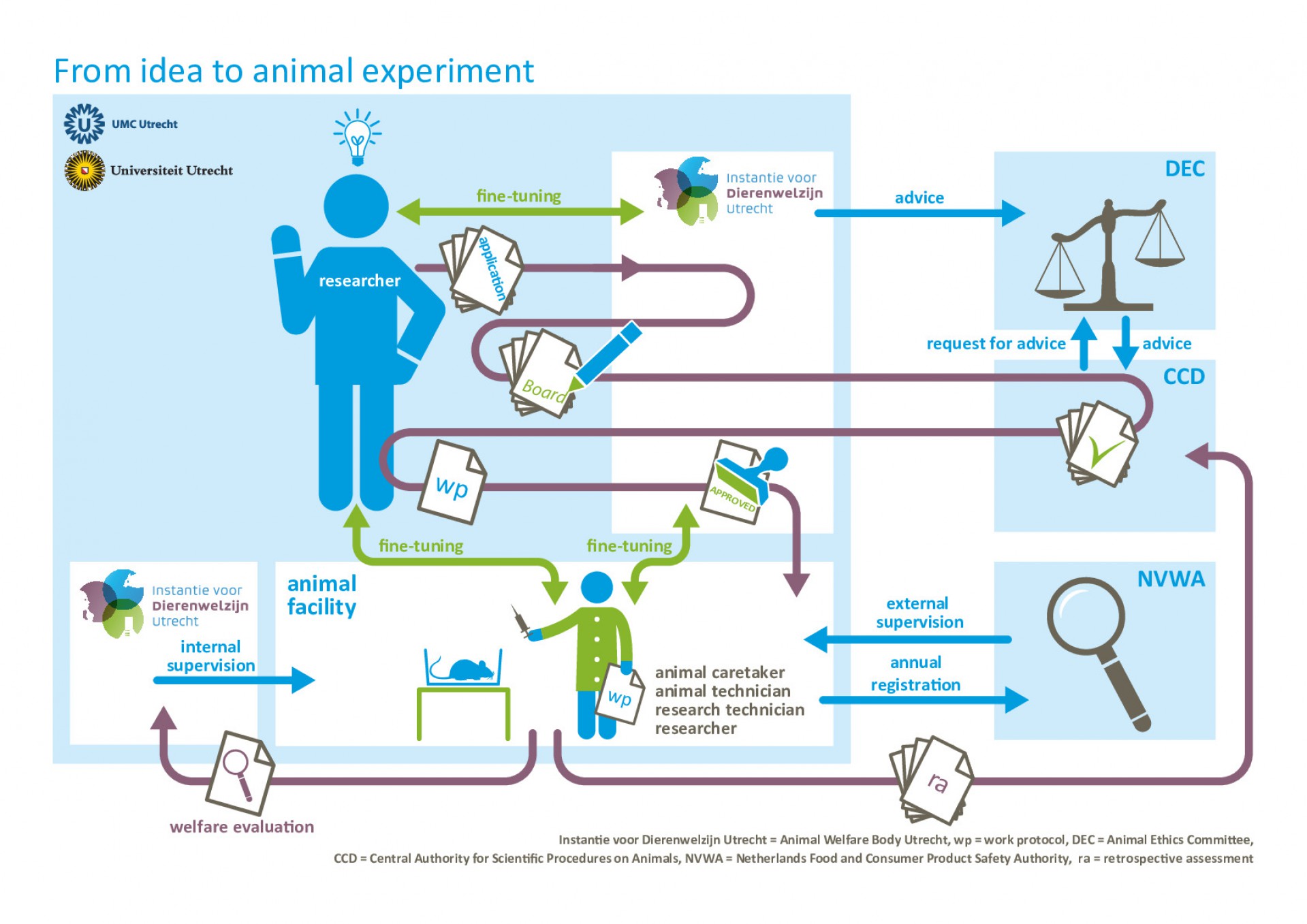Info centre
Enter a search term and / or choose filters to find information.
Ethical Animal Experiments
Researchers at Utrecht University and UMC Utrecht conduct veterinary and biomedical research. In addition to experiments that rely on cell and tissue culture techniques, computer simulations and human volunteers, this research occasionally involves experiments on animals. Laboratory animals are also used for education and training. A basic principle of all research conducted in Utrecht is that animals can experience a state of welfare and have an intrinsic value.
Ethical consideration
The basic principle underlying all animal research at Utrecht University and UMC Utrecht is the recognition that all animals have an intrinsic value. This means that animals have value for themselves, regardless of their utility for humans.
Dilemmas about animal experiments
Experts respond to questions about animal experiments and outline the dilemmas that are involved. Should you test a new headache pill on animals? And new cancer medicine? Or can it be done differently? With this video, the Utrecht Animal Welfare Body wants to add nuance to the debate about animal experiments. The video was made in collaboration with Liftov.
Policy and guidelines
The Utrecht Animal Welfare Body has formulated its internal policy with regard to experiments on animals. The policy applies to all activities within Utrecht University and the UMC Utrecht and is ratified by the Executive Board and the Board of Directors. Everyone within the two institutions should adhere to this. In order to guarantee the responsible use of laboratory animals, all employees of Utrecht University and UMC Utrecht who are involved with laboratory animals or experiments on animals must furthermore adhere to various guidelines and ‘codes of practice’.
Advice and Support
The Utrecht Animal Welfare Body offers advice and support to anyone involved in animal experiments at Utrecht University and UMC Utrecht.
Qualified, knowledgeable and competent?
Legislation requires that those involved in experiments on animals must be qualified, knowledgeable and competent. Qualification is about having the right diplomas and certificates (that are recognized in the Netherlands), whilst knowledgeable means that you develop yourself subsequently and continuously in laboratory animal sciences. This is mostly related to the 3R’s (Replacement, Reduction and Refinement) Competence has to do with having the right, demonstrable experience attitude, knowledge and skills to be entrusted to perform procedures.
Tasks and responsibilities in the animal experiment chain
2021 Annual report on Animal Experiments
This is the English summary of the 2021 Annual Report on Animal Experiments by Utrecht University and the University Medical Center Utrecht (UMC Utrecht). It provides information about the use of laboratory animals by the two institutions.
Integrity in research
Every researcher should conduct scientific research with integrity, especially those researchers doing experiments with animals. We don’t want to provoke unnecessarily distress, kill laboratory animals because of poorly designed experiments, draw incorrect conclusions, or being influenced by parties who have an interest in the outcome.
Professional Behaviour help desk
Students or employees who encounter a situation with animals in experiments that violates ethical or legal standards concerning animal welfare, can report it to the 'Professional Behaviour and Animal Welfare' help desk.
Lesson plan animal experiments
Better Animal Research through Open Science (PDF)
Lifelong Learning policy
On 15 March 2023, the Lifelong Learning (LLL) policy, approved by the establishment licence holders UMC Utrecht and Utrecht University on 5 October 2021, goes into effect.
Unexpected discomfort in laboratory animals
It is possible that laboratory animals have unexpected discomfort. Discomfort is the legal term for negative well-being, ranging from mild stress to severe pain. Laboratory animals are regularly monitored for this. If an audit reveals unexpected discomfort, act quickly and make a note of what is going on and what is being done to help others learn from it.


